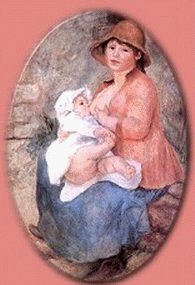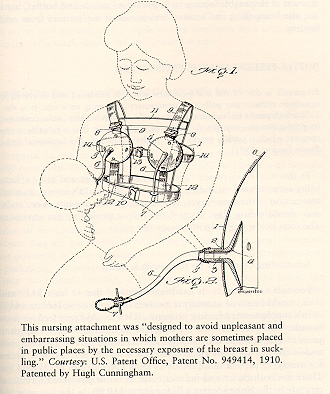| |
Breast
has always been best!

THE most suitable food for infants is that of Nature's
own providing - mothers' milk. In very exceptional instances
is this supply shortcoming during the first few weeks after
child-birth. If, unhappily, the contrary should be the case,
a delicate infant can seldom be successfully reared without
the aid of a wet-nurse.
The only circumstances which should
prevent a mother from suckling her offspring are a too
excitable temperament, or a consumptive state of
constitution. Ordinary debility, consequent on recent
confinement, is rarely an impediment to the fulfilment of
one of the highest instincts of human nature, and one no
less productive of moral than physical benefits. During the
time a child receives nourishment at its mother's breast the
earliest bond of sympathy, destined to influence a lifetime,
of parent and child, is mutually formed.
 Whatever changes it may be necessary to
make in the dietary of an infant after the age of six weeks,
absolute necessity alone should induce the substitution of
artificial in lieu of the natural food. The first milk is of
a purgative character, and is admirably adapted to cleanse
the system of a new-born babe. In this particular the most
desirable wet-nurse might fail to prove a fitting deputy for
the mother. Likewise, throughout the period of nursing, it
is a point of great importance that the quality of the
nourishment should be proportionate to the age of the
infant. If the services of a wet-nurse be inevitable, it
should be sought to engage one who has been a mother about
the same length of time as the parent of the infant to be
brought up. In selecting a wet-nurse a medical man is the
best medium.
Whatever changes it may be necessary to
make in the dietary of an infant after the age of six weeks,
absolute necessity alone should induce the substitution of
artificial in lieu of the natural food. The first milk is of
a purgative character, and is admirably adapted to cleanse
the system of a new-born babe. In this particular the most
desirable wet-nurse might fail to prove a fitting deputy for
the mother. Likewise, throughout the period of nursing, it
is a point of great importance that the quality of the
nourishment should be proportionate to the age of the
infant. If the services of a wet-nurse be inevitable, it
should be sought to engage one who has been a mother about
the same length of time as the parent of the infant to be
brought up. In selecting a wet-nurse a medical man is the
best medium.
During the first two or three weeks an
infant, if awake, may be suckled at intervals of
from one to two hours. The sooner, however, the babe can be
brought into the habit of being fed once every two hours,
the greater will be the benefit derived from the
nourishment, and the more speedily will the mother be
enabled to regain her own strength. A determination to
attain regularity in feeding is all that is needed. When
this plan is steadily pursued, the digestion of a child will
work with the precision of the clock by which its meals are
regulated. All cries should not be supposed to arise from
craving for food. Numberless causes of irritation may
occasion a fretful cry - cold feet, pressure of clothing,
wet linen, a flea, or other discomfort. Instead, therefore,
of giving food instantly, it is advisable to open the
clothing, warm the tiny feet, chafe the limbs, or, if
possible, take the infant for a little walk out of doors.
If, after having tried similar remedies, the fretfulness
continue, the cause should be sought in the condition of the
child's stools. If signs of griping pains or colic be
evident, less food should be given, and the interval between
the meals lengthened.
Sometimes a cry of continual distress
prevails, from the mother's milk being not sufficiently
nourishing to satisfy the appetite of the babe. In such case
it is advisable to give, every night and morning, a meal of
cow's-milk and water, prepared in the following manner:-
Fresh milk (from ONE cow), warm water - of each a quarter of
a pint sugar of milk - one tea-spoonful. The latter should
first be dissolved in the warm water then the milk, unboiled,
mixed with it. Sweetening with sugar of milk, instead of
lump sugar, makes a greater resemblance to the mother's
milk. Possibly the infant may take but half the above
quantity; we only give the recipe to show the right
proportions. An older child might require all at a meal.
A lactometer (a small instrument to test
the quality of milk) may be had at very trifling cost, and
affords some indication of the genuineness of milk. The
condensed milk (which has lately been introduced into this
country) is one of the greatest boons placed within the
reach of dwellers in crowded cities. All children like it,
and thrive on its use.
The practice of giving thickened food to
infants at too tender an age is a source of endless trouble,
as before observed. In one of Dr. Edward Smith's admirable
articles on dietary he remarks that the feeding of young
infants on bread, flour, biscuits, and other substances than
milk, is a "constant source of derangement of the
liver, and a frequent cause of fits." However
considerable the quantity of such food passed into the
stomach of a young infant may be, the body is not thereby
nourished, but irritated. A babe, like an adult, is only
nourished by what it has power to digest.
As a general rule a babe ought to be
entirely nourished on milk until the first tooth appears.
Even after that period milk should for a considerable time
form the staple article of food. Larger quantities should
then be given, and greater intervals between the meals
observed. It is estimated that a babe three months of age
will consume at least three pints of milk in twenty-four
hours.
"Up to six or seven months of
age," Dr. Letheby says, "infants have not the
power of digesting farinaceous or fibrinous
substances." After that age many descriptions of
farinaceous food may be used, and are to be strongly
recommended.
Beef-tea, veal, chicken, or mutton broth
are apt to turn acid and cause flatulence or sickness, and
should not be given without medical advice. Careful feeling
of the way should be observed in every change of infants'
diet, especially if teething be in operation.
A needless source of alarm is sometimes
excited by an infant throwing up milk in a curdled state.
This appearance is perfectly natural in milk rejected from
the stomach of a healthy child. The quantity rejected is
simply that which was in excess of the child's want, and is
Nature's mode of relief in infancy. If the milk be rejected
in a dense mass, it is a sign either that less would be
sufficient or that the interval between taking nourishment
should be lengthened. But if, immediately on being put to
the breast, or on beginning to suck a bottle of food, the
stomach throw off the food, the condition of the parent or
child should receive attention.
A very necessary treatment after a meal
consists in lifting the babe across the nurse's left
shoulder, whether awake or asleep, and gently patting
the infant's back until the wind displaced by food is thrown
off the stomach. Wherever this precaution is used gripes and
windy colic are seldom heard of. So great is the relief that
infants accustomed to the treatment struggle to lift
themselves up after having been fed.
The period of weaning is one of great
anxiety. Make the change gradually. A little self-restraint
in keeping out of sight when the child may naturally be
supposed to be hungry, is the greatest act of kindness to
the little one. The most favourable time for weaning is in
warm weather, when the infant can be amused and kept much
out of doors.
The time an infant should take to imbibe
half a pint of liquid food should not be less than from
twenty minutes to half an hour. In order to secure the
necessary delay, the elastic top should be examined before
each meal, to see whether the hole through which the food
passes has extended with use. If so, a tie-knot with a fine
needle and sewing-silk should be made across the hole. It
should be borne in mind that only such food as has been
thoroughly mixed with saliva proves easy of digestion. The
temperature of an infant's food should be that of its body.
This may be maintained during feeding-time by placing the
main quantity in a vessel containing hot water, within reach
of the nurse's hand for replenishing.
Throughout the period of early
infancy, the best time for giving food is before sleep;
indeed, the act of taking food induces slumber. Its
importance being pre-eminent, it is better to waste the
remnant of a meal than to keep a sleepy child awake to eat.
With ordinarily healthy infants, however, there will be
little of this, if regularity be observed on the part of the
nurse or mother. At regular hours they will demand their
food, and about as regularly go off to sleep just as they
get to the end of it, which is a great comfort to all
concerned.
The utmost cleanliness should be observed
in every detail connected with the keeping of all utensils
for nursery use. When removed from the bottle, the india-rubbery
top should be immediately placed in a glass of clean water,
and the bottle cleansed from every trace of food, and twice
a day rinsed out with tea-leaves and water.
When not in use, the bottle should be
hidden from the infant's sight. The india-rubber tube should
have water blown through it regularly, and at least once a
day be scrubbed through with one of the brushes sold for
that purpose. The teat or mouth-piece should always be care
fully examined, if a new one, before use. If this precaution
is not taken, it will often happen that no power of suction
the infant possesses can extract anything through the
aperture ; while through others, on the other hand it may
come far too freely. The teat improves with use for a
certain time, but after that may spoil, and should be
examined from time to time, especially if the bottle appears
to be emptied with too great rapidity. A little sugar
sprinkled over the top of a feeding-bottle will often induce
an infant to take the artificial food.
Not more food than is likely to be
consumed at a meal should be prepared at a time, owing to
the tendency of milk and farinaceous articles to turn
rapidly sour and become altogether unfit for infants' food.
The best farinaceous foods for very young
infants are prepared on Baron Liebig's plan, a quantity of
finely ground malt being mixed with the baked flour. When
properly prepared, the malt acts chemically upon the flour
so as to produce fluidity and assist digestion This food can
be prepared so as almost exactly to resemble woman's milk in
composition ; and children have been reared on it whose
delicate stomachs had rejected cow's milk.
Farinaceous articles for night-feeding
should not be kept over a lamp ; diluting such articles with
boiling water is a safer plan. Water is easily kept at
boiling heat in an ordinary Etna.
|